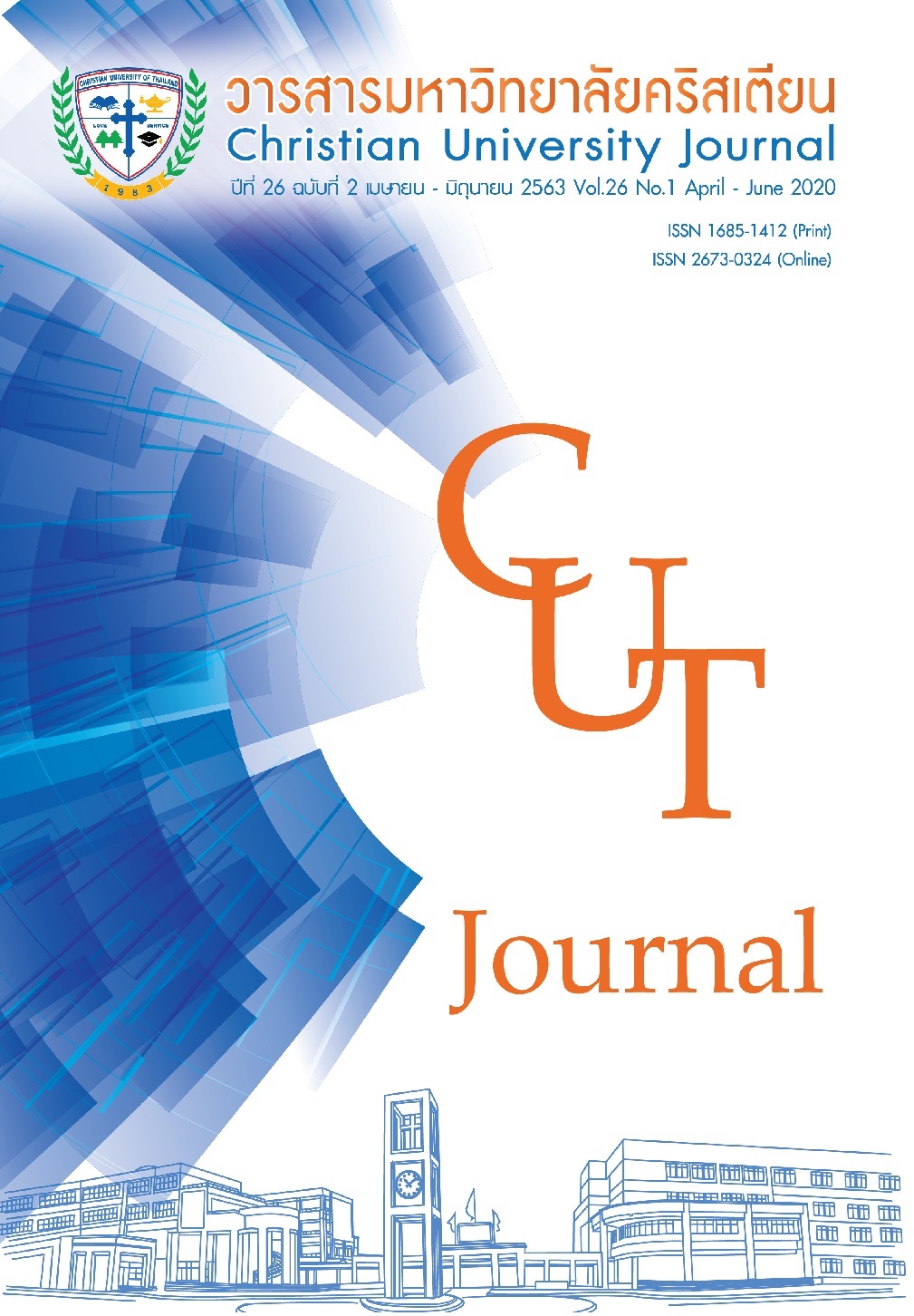ปัจจัยการรับรู้การสนับสนุนจากองค์การที่ส่งผลต่อความยึดมั่นผูกพันในงาน ของพนักงานระดับปฏิบัติการกลุ่มอุตสาหกรรมผลิตเครื่องใช้ไฟฟ้า จังหวัดระยอง
คำสำคัญ:
การรับรู้การสนับสนุนจากองค์การ, ความยึดมั่นผูกพันในงานบทคัดย่อ
การวิจัยครั้งนี้มีวัตถุประสงค์เพื่อศึกษาการรับรู้การสนับสนุนจากองค์การความยึดมั่นผูกพันในงานของพนักงานและศึกษาการทำนายของตัวแปรการรับรู้การสนับสนุนจากองค์การที่มีต่อความยึดมั่นผูกพันในงานของพนักงาน กลุ่มตัวอย่างคือพนักงานระดับปฏิบัติการในกลุ่มอุตสาหกรรมผลิตเครื่องใช้ไฟฟ้า จำนวน 367 คน เครื่องมือที่ใช้เป็นแบบสอบถาม สถิติที่ใช้ได้แก่ ร้อยละ ค่าเฉลี่ย ส่วนเบี่ยงเบนมาตรฐาน สัมประสิทธิ์สหสัมพันธ์เพียร์สัน และการวิเคราะห์การถดถอยพหุคูณด้วยวิธีสเต็ปไวส์
ผลการวิจัยพบว่าการรับรู้การสนับสนุนจากองค์การของพนักงานระดับปฏิบัติการ โดยภาพรวมอยู่ในระดับมาก ความยึดมั่นผูกพันในงานของพนักงานระดับปฏิบัติการภาพรวมพบว่าอยู่ในระดับมาก เมื่อพิจารณาเป็นรายด้าน พบว่ามีความยึดมั่นผูกพันในงานอยู่ในระดับมากทุกด้าน ผลการศึกษาความสัมพันธ์ด้วยสมการถดถอยพหุคูณ พบว่าตัวแปรการรับรู้การสนับสนุนจากองค์การของพนักงานระดับปฏิบัติการร่วมกันทำนายความยึดมั่นผูกพันในงานได้ร้อยละ 53.40 โดยตัวแปรที่มีอิทธิพลในการทำนาย 5 ตัวแปร คือ องค์การพร้อมให้ความช่วยเหลือเมื่อพนักงานเกิดปัญหาโดยไม่ต้องร้องขอ องค์การเอาใจใส่ในชีวิตความเป็นอยู่ความปลอดภัยในการทำงาน องค์การให้ความสำคัญกับการสร้างความพึงพอใจในการทำงาน องค์การเปิดโอกาสให้พนักงานร่วมแสดงความคิดเห็นอย่างอิสระและองค์การให้ความสำคัญกับความคิดเห็นของพนักงาน
เอกสารอ้างอิง
กรมโรงงานอุตสาหกรรม กระทรวงอุตสาหกรรม. (2562). ระบบเผยแพร่และบริการข้อมูลในภาคธุรกิจอุตสาหกรรม. สืบค้นจาก http://www.diw.go.th/hawk/content.php?mode=data1search.
กองยุทธศาสตร์และการวางแผนเศรษฐกิจมหภาค สำนักงานสภาพัฒนาการเศรษฐกิจและสังคมแห่งชาติ. (2562). ภาวะเศรษฐกิจไทยไตรมาสที่สาม และแนวโน้มปี 2562-2563.สืบค้นจาก https://www.nesdb.go.th/ewt_dl_link.php?nid=9618
ดารา ทีปะปาล และ ศิรชญาน์ การะเวก. (2561). รูปแบบพฤติกรรมความคิดสร้างสรรค์และนวัตกรรมของบุคลากรในองค์การธุรกิจของไทย. วารสารวิชาการมหาวิทยาลัยกรุงเทพธนบุรี,7(1), 180-193.
ทรงศักดิ์ ภู่สีอ่อน. (2554). การประยุกต์ใช้ SPSS วิเคราะห์ข้อมูลงานวิจัย. (พิมพ์ครั้งที่ 4). มหาสารคาม: มหาวิทยาลัยมหาสารคาม.
ธนาคารแห่งประเทศไทย. (2562).รายงานแนวโน้มธุรกิจ ไตรมาสที่ 3/2562. สืบค้นจาก https://www.bot.or.th/Thai/MonetaryPolicy/EconomicConditions/BLP/BLP_TH_Q3_2019_tf0kr6bl.pdf
ธานินทร์ ศิลป์จารุ. (2560). การวิจัยและวิเคราะห์ข้อมูลทางสถิติด้วย SPSS และ AMOS. (พิมพ์ครั้งที่ 17) กรุงเทพฯ:เอส. อาร์. พริ้นติ้งแมสโปรดักส์ จำกัด.
ประสพชัย พสุนนท์. (2557). การกำหนดขนาดตัวอย่างตามแนวทาง Krejcie and Morgan (1970) ในการวิจัยเชิงปริมาณ. วารสารวิชาการศิลปศาสตร์ประยุกต์, 7(2), 112-121.
รัตนาภรณ์ ม่วงสวย, เก็จกนก เอื้อวงศ์ และ สุทธิวรรณ ตันติรจนาวงศ์. (2560). ความสัมพันธ์ระหว่างการใช้อำนาจของผู้บริหารสถานศึกษากับความผูกพันต่อองค์การของครู สังกัดสำนักงานเขตพื้นที่การศึกษามัธยมศึกษา เขต 8.วารสารวิชาการและวิจัยสังคมศาสตร์,12(35), 101-116.
สำนักงานแรงงานจังหวัดระยอง. (2562). ข้อมูล/สถานการณ์ด้านแรงงานจังหวัด. สืบค้นจาก http://rayong.mol.go.th/situation
สำนักงานเศรษฐกิจอุตสาหกรรม กระทรวงอุตสาหกรรม. (2562 ก.). รายงานภาะเศรษฐกิจอุตสาหกรรมไตรมาสที่ 3/2562.สืบค้นจากhttp://www.oie.go.th/assets/portals/1/fileups/2/files/Industry%20conditions/r_julsep2562.pdf
สำนักงานเศรษฐกิจอุตสาหกรรม กระทรวงอุตสาหกรรม. (2562 ข.) ดัชนีผลิตภาพแรงงาน ไตรมาสที่ 3/2562. สืบค้นจาก https://indexes.oie.go.th/manufacturingProductionIndex02.aspx
อรพินทร์ ชูชม. (2557). การวิเคราะห์โครงสร้างความยึดมั่นผูกพันในงาน. วารสารวิชาการมหาวิทยาลัยการจัดการและเทคโนโลยีอีสเทิร์น,11(2),75-79.
อัมพิกา สุนทรภักดี. (2559).การรับรู้การสนับสนุนจากองค์การ การรับรู้ความสามารถของตนเองด้านอาชีพ และผลการปฏิบัติงานของพนักงานในธุรกิจประเภทอาหารและเครื่องดื่มแห่งหนึ่ง โดยมีการยึดมั่นต่อเป้าหมายเป็นตัวแปรสื่อ. (วิทยานิพนธ์ปริญญาศิลปศาสตรมหาบัณฑิต) มหาวิทยาลัยธรรมศาสตร์, กรุงเทพฯ.
Alleyne, P., Hudaib, M., &Haniffa, R. (2018).The moderating role of perceived organisational support in breaking the silence of public accountants. Journal of Business Ethics, 147(3), 509-527. doi:http://dx.doi.org/10.1007/s10551-015-2946-0
Anna L. Kralj& David J. Solnet. (2011). The influence of perceived organizational support on engagement: a cross-generational investigation in the hospitality industry. International CHRIE Conference-Refereed Track., 1-9. Retrieved formhttp://scholarworks.umass.edu/ refereed/ICHRIE_2011/Thursday/9
Claudia, M. (2018).The Influence of Perceived Organizational Support, Job Satisfaction and Organizational Commitment toward Organizational Citizenship Behavior (a study of the Permanent Lecturers at University of LambungMangkurat, Banjarmasin).Journal of Indonesian Economy and Business, 33(1), 23-45.
Dai, K.L., & Qin X.Y. (2016). Perceived Organizational Support and Employee Engagement: Based on the Research of Organizational Identification and Organizational Justice. Scientific Research Publishing, Open Journal of Social Sciences, 4, 46-57.
Eisenberger, R., Huntington, R., Hutchison, S., & Sowa, D. (1986).Perceived organizational support.Journal of Applied Psychology, 71(3), 500–507.
Fristin, Y., Nimran, U., Musadieq, M. A. &Utami H. N. (2019). The Relationship Among Superleader, Perceived Organizational Support and Work Performance Mediated By Work Satisfaction and Employee Engagement. International Journal of Recent Technology and Engineering (IJRTE).8(4), 2406-2415. Retrieved from https://www.ijrte.org/wp-content/uploads/papers/v8i4/D7176118419.pdf
Getachew, D. S., & Zhou, E. (2018).The Influences of Transformational Leadership on Collective Efficacy: The Moderating Role of Perceived Organizational Support. International Journal of Organizational Innovation (Online), 10(4), 7-15. Retrieved from https://search.proquest.com/docview/2028835177?accountid=43140
Jurek, P. &Besta, T. (2019).Employees’ self-expansion as a mediator between perceived work conditions and work engagement and productive behaviors.Curr Psychol. https://doi.org/10.1007/s12144-019-00241-w
Kahn, William. A. (1990). Psychological conditions of personal engagement and disengagement at work. The Academy of Management Journal, 33(4), 692-724. Retrieved from https://www.talenteck.com/academic/Kahn-1990.pdf
Karatepe, O. M. &Ngeche, R. N. (2012). Does job embeddedness mediate the effect of work engagement on job outcomes? A study of hotel employees in Cameroon.Journal of Hospitality Marketing and Management, 21(4), 440-461.
Karatepe, O. M., & Aga, M. (2016). The effects of organization mission fulfillment and perceived organizational support on job performance. The International Journal of Bank Marketing,34(3), 368-387. Retrieved from https://search.proquest.com/docview/1785176539?accountid=43140
Kundu, S. C., &Lata, K. (2017). Effects of supportive work environment on employee retention. International Journal of Organizational Analysis, 25(4), 703-722. Retrieved from https://search.proquest.com/docview/1937702210?accountid=43140
Lathabhavan, R., Senthil, A. B., &Natarajan, T. (2017). A psychometric analysis of the utrecht work engagement scale in indian banking sector. Industrial and Commercial Training, 49(6), 296-302. doi:http://dx.doi.org/10.1108/ICT-04-2017-0031
Mathumbu, D., & Dodd, N. (2013).Perceived organizational support, work engagement and organizational citizenship behavior of nurses at Victoria Hospital.Journal of Psychology, 4(2), 87–93. htps://doi.org/10.1080/09764224.2013.11885497
Meintjes, A., &Hofmeyr, K. (2018).The impact of resilience and perceived organizational support on employee engagement in a competitive sales environment.SA Journal of Human Resource Management, 16(0), a953 doi:http://dx.doi.org/10.4102/sajhrm.v16i0.953
Putra, P. U. & Surya, I. B. (2019).The effect of perceived organizational support on work engagement and turnover intention.International Journal of Education and Social Science Research, 2(4), 19-33.
Schaufeli, W. B., Salanova, M., González-Roma, V., & Bakker, A. B. (2002).The measurement of engagement and burnout: A confirmative analytic approach. Journal of Happiness Studies, 3(1), 71–92. https://doi.org/10.1023/A:1015630930326
Wen, J., Li, Y., &Hou, P. (2016).Customer mistreatment behavior and hotel employee organizational citizenship behavior. Nankai Business Review International, 7(3), 322-344. Retrieved from https://search.proquest.com/docview/1826443064?accountid=43140



